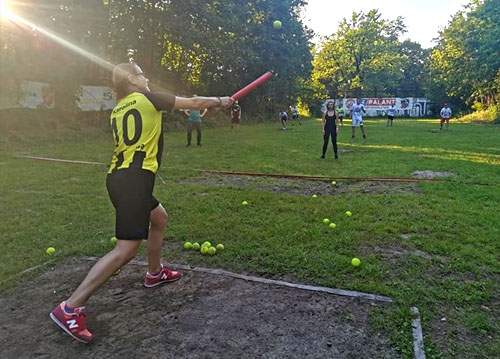Info
The basic aim is to hit the ball with a wooden stick (around 60 cm long), called a palant or a palestra, into the field, and then to run to the next “bases” as soon as possible. The task of the hitting player is to run all the four bases and come back to the first base, called “the nest” (in Palant it is called “zapłot”).
At the same time, the players of the opposing team try to catch the hit ball and hit the running rival with it. If he/she is hit between bases, this player is eliminated from this round.
If the ball hits the “hell” (piekło) square, play continues until either the player is knocked between bases or it is thrown over the starting line towards “hell”, then play is stopped and if the player has not reached the next base, he returns to the previous base. The defenders can pass the ball between themselves, while the attacker cannot deliberately touch the ball in play - if he/she does it intentionally, there is an automatic change of sides.
Attacking players can't run out of “hell” zone either - then there would also be a change of sides.
The pitch is 20 meters wide x 50-60 meters long. You need to draw there the bases for two different zones: “Niebo” (eng. “Heaven”) and “Piekło” (eng. “Hell”). Team of “Heaven” is placed in front of the “Heaven” line and team of “hell” is placed on the field.
The hitting team (“Heaven”) tries to keep as long as possible the “Heaven” field. To do so, their players are hitting the ball with the bat as far as possible and afterwards they runto reach another bases (from no. 1 to no. 4). Each time you reach a base no. 4, you get one point. The team in the field of “hell” aims to conquer “Heaven”.
Teams switch sides when:
- The attacking team commits 3 mistakes, e.g.:
- a player, who is running to reach to the bases, is hit with the ball by defending players – this player is eliminated,
- one-handed catch (in Polish “Kampa” or “Chytek”) by one of the defending players– result: elimination of the attacking player,
- no proper hitting the ball by an attacking player in 3 attempts – he is not eliminated, but he/she goes to the first base.
- There are more than 2 people in the base no. 1.
- There are no players left in the attacking team to hit the ball.
There is a no time-restriction game. The game ends after the predetermined number of rounds (1 to 7). The winner is the team with more points earned for reaching to the base no. 4.
The players: participants are divided into two teams of 7 to 15 players. The optimal number for one team is 8 players and there are such teams playing during the tournaments.
History
The word “palant” is derived from the Italian word pallante and since the Middle Ages it meant “a ball player”.
The sources of the game of Palant in Poland date back to the Middle Ages. Over the centuries, it has developed not only in Poland, constituting an interesting, physical, team form of playing with the use of a ball and a stick.
According to some historical sources, Palant had a significant influence on the development of American baseball. Polish emigrants were supposed to bring it to America at the beginning of the 17th century. In the centuries that followed, the game and its many variations continued to evolve around the world.
In the 20th century, Palant was still popular in Poland. Especially in Silesia, where regular competitions were held.
After the second world war, even the Polish championships began to be organized, and in 1957 the Polish Palant Ball Association was established.
However, after these events, Palant started to be criticised. Some representatives of the press and academic circles were considering Palant as a secondary topic – not worthy to be treated seriously. Communist authorities were also trying to destroy traditional Polish culture. In many other countries, in which there are similar sports, this would be unthinkable.
As a result of this criticism, Palant began to lose its importance in Poland. The Polish Palant Ball Association was changed to Polish Baseball and Softball Association. Urbanization and industrialization, and consequently, fewer and fewer natural squares for playing Palant, led to the fact that this Polish sport with a centuries-old tradition began to disappear, and the word “palant” acquired a negative meaning (literally translating: “a jerk”). Such a situation in the United States or England would be difficult to imagine. In 2014, Polish Palant Association was created with the mission of reinventing Palant (it is described in more details below). There are also plans to create International Federation of Palant soon.
Physical abilities developed
motor skills: coordination and body balance, throwing and hitting accuracy, passing and catching techniques, reaction speed; social: quick decision-making, teamwork skills; cognitive: building a strategy, developing tactical thinking;



